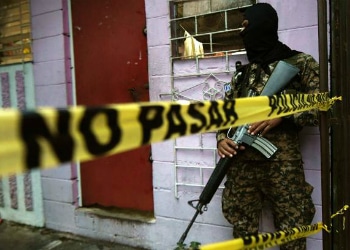The measures in the fight against the coronavirus in Central America have caused two starkly different reactions from criminal groups, some are continuing to extort local populations while others have decided to waive payments for the time being.
In El Salvador, the Barrio 18 Revolucionarios which operate in San Salvador’s Historic Center announced in late March that they would waive all payments for informal vendors in the zone, considering that the vendors would not be collecting enough to make the payments, according to El Faro. However, the group did not clarify for how long they would suspend extortion demands or when collections would resume.
And also in late March, members of MS13 in the Salvadoran capital commented to El Faro that a decision had not yet been made about whether to suspend extortion payments and that these would continue.
SEE ALSO: MS13 News and Profile
But in Guatemala City, the two largest gangs that control the Kennedy neighborhood in Zone 18, announced that they would pardon extortion payments for one week only due to the health emergency, El Periodico reported.
This type of waiver contrasts with the ongoing intimidations and threats which tradesmen in Mixco, in the outskirts of Guatemala City, have continued to receive from Colombian loan sharks, who are keeping up their high-interest loans, known as “gota a gota,” Soy502 reported on March 30.
While in Mexico, cartels like La Unión Tepito warned shopkeepers and street sellers in Mexico City’s city center and other areas that extortion payments would be kept up despite the pandemic. The gang had earlier in March reportedly faced pushback from shopkeepers who were running out of merchandise to sell.
InSight Crime Analysis
The measures imposed by authorities to contain the virus have also threatened extortion, which is the principal revenue stream for criminal groups like MS13 or Barrio 18. This means these gangs may ramp up violence to collect extortion payments from communities already under severe economic strain from the coronavirus lockdown.
According to the Global Initiative Against Transnational Organized Crime (GI), despite certain criminal organizations showing greater flexibility in collecting extortion payments, they will want to ensure money continues to flow as quickly as possible.
Therefore, GI suggested there is a high likelihood that these groups will start to collect extortion fees retroactively once quarantine measures start to be lifted.
SEE ALSO: Coronavirus Squeezing Finances of Mexico’s Criminal Groups
This coincides with the testimonies of merchants and public transportation workers in El Salvador, who told El Faro that they are saving the money that normally goes to extortion payments as they believe the gangs will come to collect sooner or later.
José Miguel Cruz, an expert on gang violence in El Salvador based at Florida International University, believes this situation will lead to violent repercussions. “It is very likely that violence will rise in this context of widespread chaos. If public institutions reach their limit due to the healthcare emergency, criminal groups will have the opportunity and space to generate fear,” he told InSight Crime.
For Cruz, criminal groups who depend on extortion may be willing to reach arrangements with local communities in order to survive. But the extent to which they will turn to violence depends on how a specific group is organized and operates, he said, with huge variations in these factors across countries, cities, and even between different cliques of the same gang.
“If groups do not only depend on extortion payments, but (have income) from semi-legal businesses, then they will have more options, but the smaller groups are the ones that tend to be more dependent on extortion,” said Cruz.
The expert also stated that communities, where gang members had a lot of family ties, would likely benefit from better conditions, such as reprieves for extortion payments. Other communities might see the pressure from gangs ramp up gradually as the economic consequences of the coronavirus lockdown become more severe.

